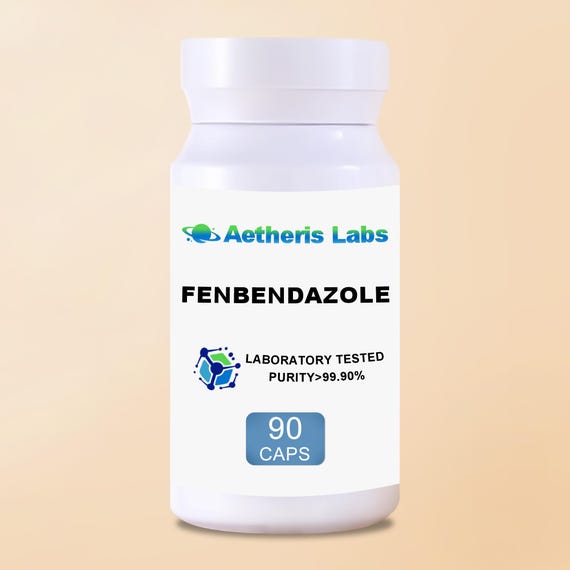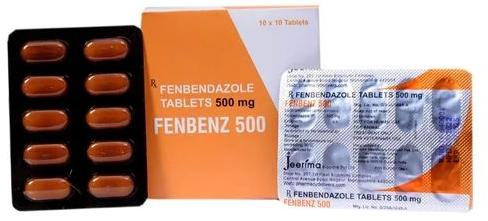Recognizing the Advantages and Uses of Fenbendazole in Vet Medication
Fenbendazole has developed itself as a key anthelmintic in vet medicine. Its capability to target various parasitic infections makes it a beneficial tool for vets. The medication's system disrupts essential mobile processes in bloodsuckers, bring about efficient treatment outcomes. Its security profile varies in between species, necessitating careful consideration in its use (fenbendazole capsules). Understanding these characteristics can shed light on fenbendazole's more comprehensive effects in vet treatment and continuous research study into its prospective past traditional applications
Device of Activity of Fenbendazole

Typical Parasitic Infections Treated With Fenbendazole
A selection of parasitical infections are efficiently treated with fenbendazole, making it a versatile alternative in vet medication. This anthelmintic representative is especially efficient against nematodes, consisting of roundworms and hookworms, which generally influence canines and cats. It is additionally utilized for the therapy of cestodes, such as tapeworms, supplying a wide range of activity versus both kinds of digestive parasites. Furthermore, fenbendazole is valuable in handling infections brought on by protozoa, especially Giardia, which can cause gastrointestinal distress in pets. Its efficacy reaches dealing with specific lungworms in pooches and felines, dealing with respiratory wellness worries linked to these parasites. Overall, fenbendazole's capacity to target numerous parasitic types makes it a valuable tool in vet method, guaranteeing the health and wellness and health of pets impacted by these typical infections.
Safety and security and Efficiency in Various Pet Variety
The safety and efficiency of fenbendazole differ among various animal species, highlighting the relevance of species-specific factors to consider in vet medication. In canines, fenbendazole is generally well-tolerated and efficient against a series of gastrointestinal parasites, including roundworms and hookworms. For felines, nonetheless, its usage is less typical and may require mindful application due to possible negative reactions.
In animals, such as cattle and sheep, fenbendazole shows effectiveness versus numerous endoparasites, contributing to improved health and wellness and efficiency. However, the pharmacokinetics and possible side results can differ markedly between varieties, demanding mindful analysis by vets.
Horses additionally react favorably to fenbendazole, specifically for dealing with strongyles and ascarids, though dose and management paths have to be customized to their distinct physiology. Recognizing these differences is important for enhancing treatment results and making sure pet well-being across diverse varieties.
Administration and Dosage Guidelines
Appropriate management and dosage standards are vital for taking full advantage of the healing results of fenbendazole while lessening potential side impacts. The dosage generally varies depending on the species being dealt with, the details condition, and the solution of fenbendazole made use of. fenbendazole capsules. For pet dogs and felines, an usual dosage is 50 mg/kg body weight, administered once daily for 3 consecutive days, but vets go may change this based on private health and wellness analyses
It is essential to provide fenbendazole with food to boost absorption and reduce intestinal distress. The medication is offered in numerous types, consisting of granules and paste, enabling for flexible administration alternatives. Keeping an eye on the animal's action throughout and after treatment is suggested to validate efficacy and security. In addition, veterinary support is important to determine the appropriate duration of treatment based on the type of parasitical infection being attended to, guaranteeing ideal end results for the animal's health and wellness.
Future Perspectives and Research Study on Fenbendazole
Research study on fenbendazole remains to evolve, concentrating check my site on its potential applications beyond conventional antiparasitic usages. Recent researches have discovered its performance in treating different types of cancer, particularly in vet oncology. Initial data recommend that fenbendazole might prevent the development of lump cells and improve the results of various other chemotherapeutic representatives.
Researchers are examining its duty in handling intestinal problems in pets, highlighting its anti-inflammatory homes. The adaptability of fenbendazole for different species elevates inquiries concerning its security profiles and optimal dosing programs in varied populations.
As rate of interest grows, there is a demand for complete scientific tests to establish evidence-based guidelines for these novel applications. Future research study might also examine the mechanisms behind fenbendazole's results, potentially leading the way for cutting-edge healing methods in veterinary medication. The ongoing expedition of fenbendazole can substantially enhance treatment alternatives for numerous veterinary problems.

Regularly Asked Concerns
Is Fenbendazole Safe for Pregnant Animals?
The safety of fenbendazole for pregnant animals remains unpredictable. While some research studies suggest very little danger, vets generally suggest care and usually discourage its use while pregnant unless the benefits clearly outweigh prospective risks.
Can Fenbendazole Be Utilized in Animals?
Fenbendazole is commonly utilized in livestock to treat various parasitical infections. 222 mg. Its efficiency against intestinal worms makes it a useful anthelmintic, contributing to enhanced health and wellness and performance in pets raised for food and fiber
What Are the Adverse Effects of Fenbendazole?

The negative effects of fenbendazole might include more info here gastrointestinal disruptions, sleepiness, and allergies. In unusual situations, much more extreme reactions might happen, demanding cautious monitoring and appointment with a veterinarian during therapy.
Just How Does Fenbendazole Compare to Various Other Dewormers?
Fenbendazole provides broad-spectrum effectiveness against various parasites, usually comparing positively to various other dewormers. Its unique device targets various life stages, making it effective, while normally presenting a positive security profile contrasted to alternatives available on the marketplace.
Can Fenbendazole Be Utilized for Dealing With Cancer in Family Pets?
The possibility of fenbendazole in dealing with cancer cells in pet dogs has gathered rate of interest. Initial studies recommend it may prevent cancer cells cell development, but further research study is required to confirm its efficiency and safety in vet oncology.